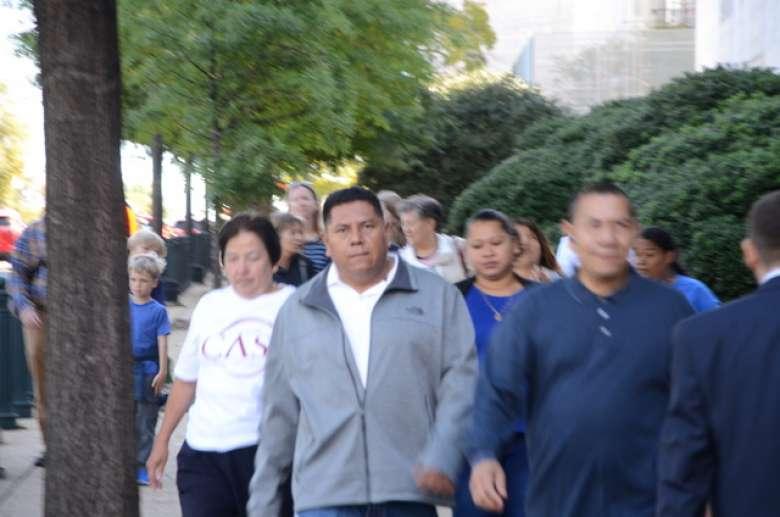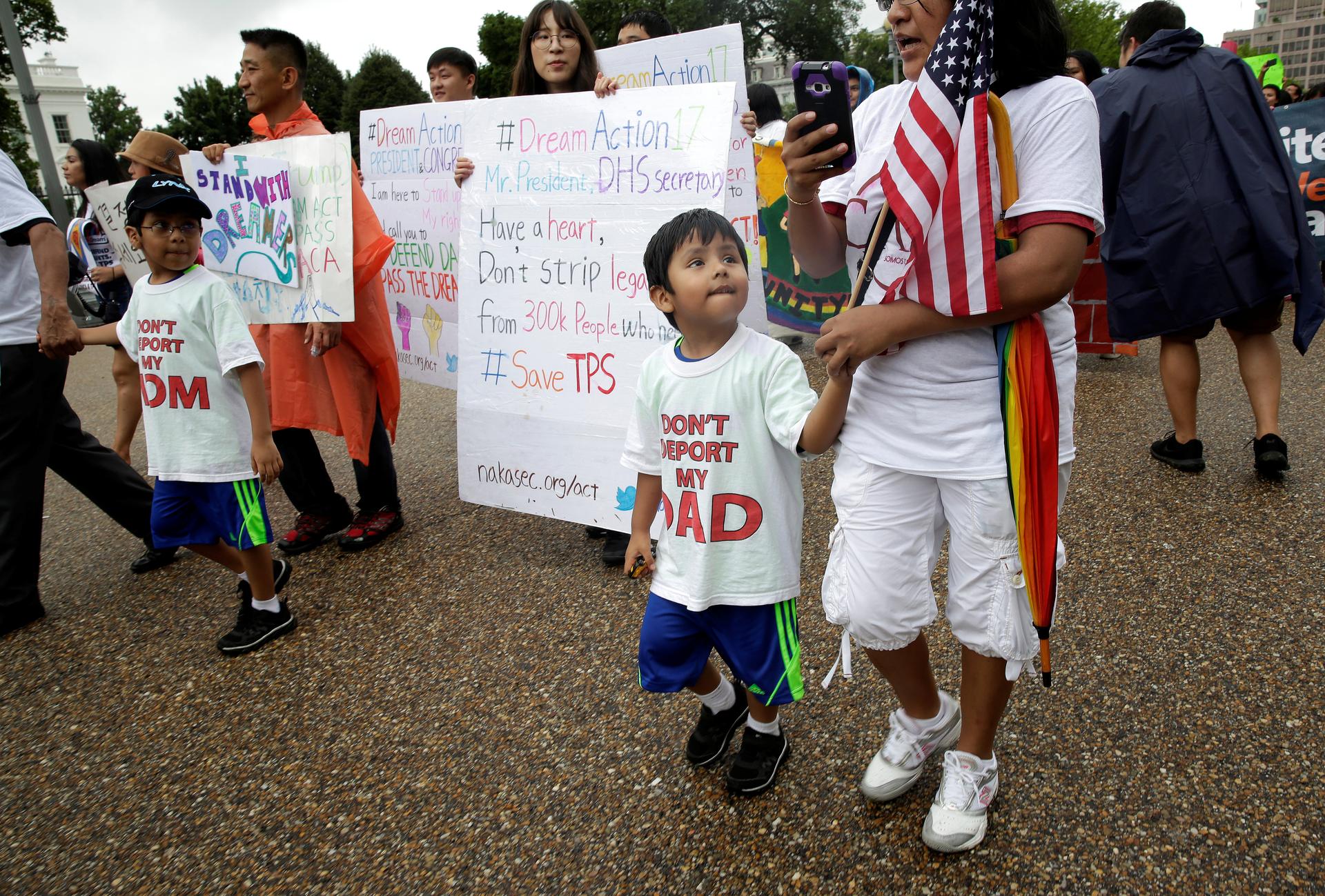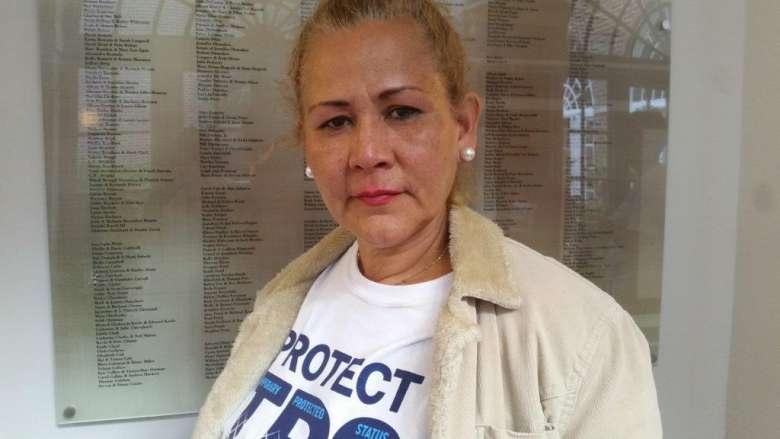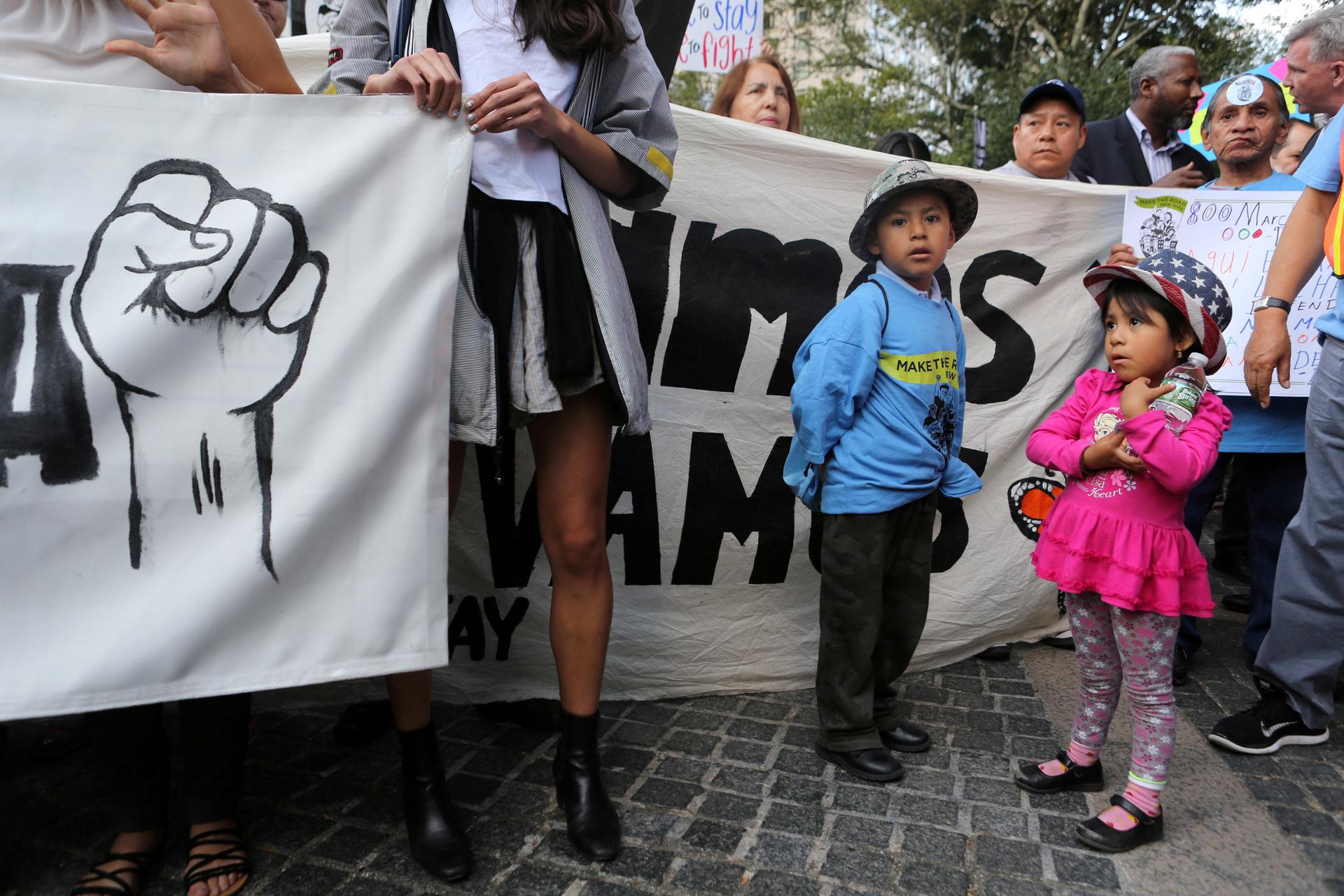Thousands of immigrants with ‘protected status’ face possible deportation
A protest in August 2017 in New York City against the cancelation of the DACA program, which protects some young undocumented immigrants from deportation and allows them to work in the US legally.
Acting Secretary of Homeland Security Elaine Duke announced late Monday, Nov. 6, that more than 5,300 Nicaraguan immigrants living and working legally in the United States since 1999 will lose their Temporary Protected Status and work permits on January 5, 2019.
Duke said conditions caused by a devastating hurricane that hit Central America in late 1998 no longer justify TPS, which protects immigrants from deportation. Duke said Homeland Security hasn’t yet decided whether to end TPS for more than 86,000 Honduran immigrants also protected from deportation since 1999. Absent a decision, Hondurans were automatically given a six-month extension Monday that lasts through July 5, 2018. But Duke warned that the Hondurans’ TPS could also ultimately be terminated “with an appropriate delay.”
Because of the difficulty immigrants here for two decades now face, Duke called on Congress “to enact a permanent solution for this inherently permanent program.” CASA, a national immigrant rights group, denounced the decisions, warning that “families with children who are US citizens will be destroyed” as TPS holders are “discarded.”
The UNITE HERE labor union called Homeland Security’s actions “astounding cruelty” and “a stain on American history” that will “forcibly tear” people from their US-born children, jobs, businesses and homes.
Juan Cortez of Maryland owns his own trucking business — he’s almost paid off the $50,000 loan he took to start it — and he holds county contracts to plow snow every winter just outside Washington, DC. After nearly a quarter of a century here, the Salvadoran immigrant is also the proud owner of a home, and he pays tens of thousands of dollars in annual taxes. He has a daughter in college and a son in high school who’s in the ROTC, the Reserve Officer Training Corps.

“My son wants to serve this country,” said Cortez, 47, who lives just miles from the nation’s capital. “But what If I can’t be here anymore?"
Cortez has plenty of reason to worry. In a matter of months, the Trump Administration could turn this entrepreneur and dad and hundreds of thousands of others into instant undocumented immigrants, no longer allowed to live and work here legally. With the stroke of a pen, the Department of Homeland Security could either end — or extend — a quasi-legal state known as Temporary Protected Status, or TPS, that Cortez and 263,280 other Salvadorans already in the United States were granted way back in 2001. But no one knows quite what’s going to happen next. Earthquakes that devastated El Salvador in 2001 were the rationale for the US to initially provide such status to Salvadoran immigrants who were already here, and who mostly arrived illegally. They had to pass background checks and other vetting to receive TPS status, and they must repeat that vetting every 18 months, and pay for it themselves.
Related: Trump's immigration priorities tie a deal for 'Dreamers' to building the border wall
The majority of the Salvadorans who were in the United States in 2001 had fled Central America to escape poverty and the violence of a brutal Cold War-era armed conflict in the 1980s and 1990s in which the US was heavily involved.
The TPS designation that brought these Salvadorans out of the shadows was also provided to others as the result of natural disasters; about 5,350 Nicaraguans and 86,180 Hondurans have had TPS since 1999 because of a massive hurricane that caused widespread destruction. More than 58,700 Haitians have had TPS since 2010 because of unprecedented earthquake damage. Many of those who enjoy TPS have been in the US for years, and have built businesses and had children, just like Juan Cortez. Their stays have been extended again and again by both Republican and Democratic administrations.
But the day of reckoning may have arrived. The Trump Administration has already issued a warning that Haitians could lose TPS for good in January after a six-month extension that began in June. Later today, Hondurans and Nicaraguans will learn if they could also face a deadline in the near future (see update). Salvadorans are anxious about an announcement about their fate that could come in March. If TPS is terminated, more than 300,000 people will lose protection from deportation and also forfeit the work permits they’ve been paying to obtain every 18 months for many years.
Related: The deadline to renew DACA is here, but 36,000 people still have not applied
They will face desperate choices, as a result. Juan Cortez and thousands like him will have to choose between returning to countries that remain dysfunctional and dangerous, or slipping into the shadows in cities like Washington, Miami, Los Angeles, New York and Houston and trying to evade deportation. And they’ll have to decide what to do with hundreds of thousands of their children who are US citizens because they were born here.

“I don’t think Trump really understands what’s at stake. These folks have been here so long, you just can’t be so heartless,” said Bill Hing, a law professor at the University of San Francisco who has written about America’s love-hate history with immigrants. “It would be a bombshell overnight for all those people to be declared undocumented,” Hing said.
Unwinding TPS
TPS has historically protected foreign nationals from deportation because US officials have determined that a country reeling from war, a health emergency or a natural disaster would be unable to absorb returnees safely and without chaos. US national interests in not contributing to instability in foreign countries is also a factor.
Officials can renew TPS status for immigrants, or they can end it if they determine that conditions in a particular country have sufficiently improved. Since the TPS framework was created by Congress in 1990, some foreign nationals have seen their TPS status end. Bipartisan support from Republican and Democratic administrations has helped nationals from El Salvador, Honduras and Haiti retain TPS.
Related: High school is hard enough without having to deal with the loss of DACA
But the message seemed to change last May, when then-Secretary of Homeland Security John F. Kelly announced that Haitians granted TPS in 2010 would benefit from only a limited extension of six months, from July into January. Although Kelly didn’t say TPS would definitively end in January for Haitians, he urged the immigrants to use the six months to obtain travel documents and arrange for their “ultimate departure from the United States.”
Now Hondurans and Nicaraguans who’ve been living here under TPS since 1999 are anxiously waiting a decision on their fate, and Salvadorans know they’re next (see update).
Tyler Houlton, acting press secretary for Homeland Security, said late last week that “we are not able to comment because no decision has been made regarding TPS status for Nicaragua and Honduras.” Staff at the Department of State, which makes TPS recommendations to Homeland Security, also declined to comment. The Washington Post reported Friday, however, that Secretary of State Rex Tillerson recently wrote to Homeland Security, opining that conditions in Central America and Haiti that originally triggered TPS no longer supported providing protected status.
Related: Why this DACA recipient won't be extending her protected status, but says others should
Those with Temporary Protected Status have no official path to apply to transition to legal permanent residency — a green card — no matter how long they have been here, or what they have accomplished.
Some powerful voices are dissatisfied with the duration of TPS designations. Iowa Republican Sen. Chuck Grassley, chairman of the Senate Judiciary Committee, argued in a letter to Homeland Security last week that TPS has been extended so often that TPS immigrants are filling jobs that could be opened to Americans.
“I hope you will explore and pursue these long overdue opportunities to return populations of otherwise unauthorized immigrants to their homes, where they can be of most use,” Grassley wrote. He asked if data used to request TPS designation could later be used to locate people for removal once TPS has ended.
But a rare coalition of strange bedfellows have united in opposing the end of TPS designation. Members of Congress in regions with large numbers of TPS immigrants — including Florida Republicans — are urging the administration to consider the consequences of subjecting so many employed, taxpaying immigrants to deportation. Churches and labor unions have chimed in as well.
Related: Trump's new travel ban 'still smells and looks like a Muslim ban,' activists say
On Oct. 30, the US Chamber of Commerce sent a letter to Homeland Security acknowledging that TPS is intended to be temporary, but also imploring the administration to seek a realistic solution.
“The reality is these individuals have now lived and worked in communities across this nation for in some cases nearly two decades now. We urge you to extend the current TPS designations and to work with Congress on a more permanent resolution to the status of these TPS beneficiaries,” the Chamber wrote.
“We are not a burden to the government,” Paredes said, tears spilling down her cheeks. “We pay our taxes. We pay our own medical insurance. We are honorable people. We are not criminals.”
“The loss of employment authorization for these populations would adversely impact several key industries where TPS recipients make up a significant amount of the workforce. These industries include construction, food processing, hospitality, and home healthcare services.”
Labor unions and the Chamber, often at odds, both argue that there would be labor shortages if TPS holders were stripped of work permits, costing businesses cash and eliminating contributions immigrant workers make to Social Security and Medicare.
'Clocks ticking away'
Maria Elena Durazo, general vice president of the UNITE HERE labor union, said, “Our immigrant workers who keep the hospitality industry highly profitable and are key to the economic health of cities like Orlando, Miami, New York City and L.A.”
Recently, at All Souls Church in Washington, DC, Dina Paredes, a union housekeeper at a luxury hotel who has lived in Los Angeles for 20 years, 16 of them under TPS, wept as she described the anxiety she and other TPS recipients are suffering.
“We feel like clocks ticking away, yes or no, yes or no,” the Salvadoran mother of two US citizen kids, 13 and 16, said. “My children ask me, ‘Mommy are they going to deport you? Mommy, we don’t want to go to El Salvador.’ If I return to El Salvador with my children, they won’t know what to do. I fear they’d be killed, raped.”

The 50-year-old was in Washington to visit congressional staff members as part of a national effort by labor unions, churches and businesses to try to preserve TPS or persuade Congress to find a solution.
Activists with UNITE HERE said they were dismayed that many congressional staff seemed unaware of the predicament that TPS holders face. Hill staff were more familiar with Deferred Action for Childhood immigrants, a separate temporary status that a limited group of people brought here illegally as children were given under President Obama. Trump ended DACA and urged Congress to find a legislative solution so DACA holders could stay.
Paredes also complained that immigrants are up against hostility stemming from a widespread impression that they don’t pay taxes or contribute enough to local economies. TPS holders who work on the books, as many do, pay into Social Security, among other regular requirements, but are not eligible to receive Social Security benefits.
“We are not a burden to the government,” Paredes said, tears spilling down her cheeks. “We pay our taxes. We pay our own medical insurance. We are honorable people. We are not criminals.”
Bill Hing, the immigration lawyer in San Francisco, said the presence of Central Americans here is a legacy of controversial American involvement in a variety of Central American conflicts.
“My children ask me, ‘Mommy are they going to deport you? Mommy, we don’t want to go to El Salvador.’ If I return to El Salvador with my children, they won’t know what to do. I fear they’d be killed, raped.”
Honduras and El Salvador are struggling today with some of the highest homicide rates in the world. Justice systems are weak. Good-paying jobs are scarce. And gangs that were born in Los Angeles — and exported back to Central America — engage in forced recruitment and extortion affecting businesses and vulnerable targets that include families who receive money from US relatives. About one in every five Salvadorans now lives in the United States.
In Pennsylvania, TPS recipient Karla Alvarado, who arrived from El Salvador when she was 9 with her parents, is a 29-year-old home health-care nurse who supervises care for 55 clients, from babies to disabled and the elderly. “It’s definitely stressing me out,” she said in perfect English. The United States is her home, she said. “Where do I go from here?’
“My co-workers ask me all the time why I can’t just get citizenship.” Alvarado is married to a US citizen, but she could face a 10-year bar, minimum, preventing her from living in the United States, if her spouse tries to sponsor her for a green card.
Homeland Security officials said they don’t have data readily available breaking down where TPS recipients live in the United States. But the left-leaning Center for American Progress analyzed US Census data and estimated that the region with highest concentration of Salvadoran TPS holders is the Washington, DC metro area, with about 32, 360 recipients, followed by Los Angeles with 30,415.
“The cold hard truth,” Sanchez said, “is if they end TPS you’re not going to have a bunch of people crowding into the airport to leave. Lots of people will figure out a way to disappear into the shadows.”
“I’m so nervous I can’t even think about what I would do if I lose TPS,” said a 60-year-old Honduran who cleans buildings — including a US government office — and who asked not to be identified. For 13 years, the Virginia resident has cleaned the federal building, a job requiring a special ID, from 7:30 a.m. to 4 p.m. She then cleans a private building from 5 p.m. to 9 p.m. She’s been here for 20 years — sending money to a son back in Honduras — and spent thousands of dollars on lawyers who failed to get her permanent residency, despite her marriage to a man with a green card.
For Carlo Sanchez, who represents Maryland’s 47B district in the state House of Delegates, these stories sound painfully familiar. He knows lots of people who own homes and businesses — like trucker Juan Cortez — and whose kids are thriving in school. “My parents came here illegally to get away from that civil war,” Sanchez said. But they were able to legalize when Congress approved and President Reagan signed an amnesty in 1986 as part of an immigration reform package.
Those with TPS don’t have the same opportunity. But they don’t want to leave. And ultimately, many won’t.
“The cold hard truth,” Sanchez said, “is if they end TPS you’re not going to have a bunch of people crowding into the airport to leave. Lots of people will figure out a way to disappear into the shadows.”
The Center for Public Integrity is a non-partisan, Washington, DC-based news organization dedicated to producing original investigative journalism on issues of public concern.
